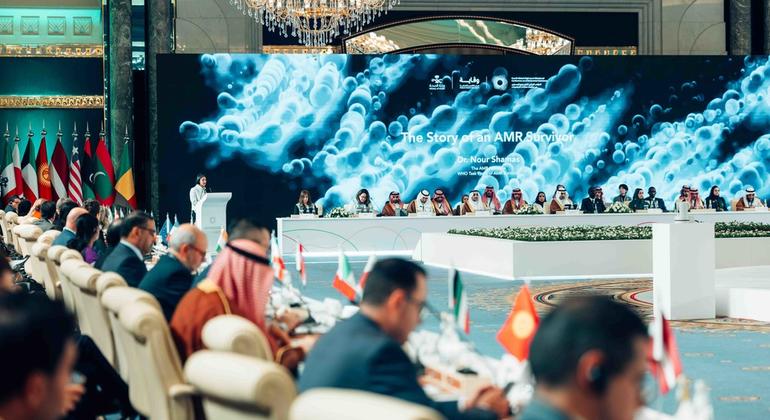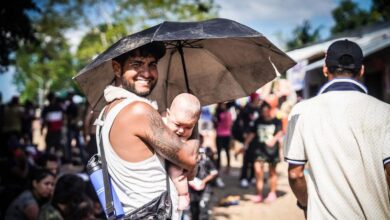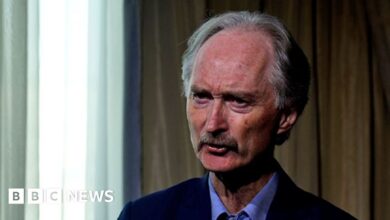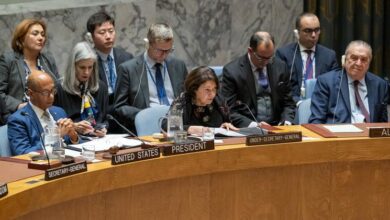The Jeddah conference ended with the adoption of global commitments to tackle antibiotic resistance

Immediately after approving the commitments in the coastal city of Saudi Arabia, Minister of Health of the host country Fahad Al-Jalajel said the conference results provide “important foundations” for the Member states and international bodies take significant action against antibiotic resistance and build on it Political statement on AMR adopted at the High Level General Assembly of the United Nations meeting a few weeks ago in New York.
The commitments highlight the role of Four-party joint secretariat on AMRincluding the Food and Agriculture Organization of the United Nations (FAO), United Nations Environment Program (UNEP), World Health Organization (WHO) and the World Organization for Animal Health (Oh). They also called for the creation of a new ‘biotech bridge’ to promote research, development and innovation to find solutions to the global threat.
Minister Al-Jalajel announced the establishment of the AMR ‘One Health’ Learning Center and the Regional Antibiotic Outreach and Logistics Center in Saudi Arabia to promote global collaboration and improve access to Access to essential antibacterial and diagnostic drugs.

Fahad Abdulrahman Aljalajil, Minister of Health of Saudi Arabia, speaking at the 4th Global Ministerial Summit on Antimicrobial Resistance (AMR), in Jeddah.
Antibiotic resistanceor AMR occurs when germs develop the ability to defeat drugs designed to kill them. It can spread between people, animals and the environment and can cause deadly infections.
Don’t leave anyone behind
Welcoming the adoption of the Jeddah Pledge, Jacqueline Alvarez, head of UNEP’s Health and Chemicals Branch, said the resulting document was an example of successful multilateralism and “the benefits of cooperation.” between different fields”.

She added: “Jeddah commitments bring Everyone has a role to play together for action.”
Ms. Alvarez said the document recognizes that countries have different capabilities to tackle antibiotic resistance and specifically addresses developing countries and how they can get involved. “We cannot leave anyone behind – which means we have to ensure that people can grow together and not widen the gap between countries,” she explained to UN News.
The UNEP official emphasized the need to scale up financing, “not only in the traditional way but also by creating opportunities to develop further research and create green and sustainable solutions, allowing everyone feel that they have a chance when it comes to protecting themselves.”
The Jeddah Conference and the previous high-level General Assembly meeting both focuses on the economic and social aspects of the AMR problem“This issue has not been thoroughly discussed,” she said.

Overview of the Second Plenary Session of the AMR Multi-Stakeholder Partnership Platform, in Jeddah, Saudi Arabia.
The fight continues
Stakeholders look forward to building global political momentum and rallying behind the fight against AMR. As soon as the conference ended, they met in parallel at the Ritz-Carlton in Jeddah for the second plenary session of the ARM’s multi-stakeholder collaboration platform chart the path forward and turn new commitments into reality.
This platform is one of three governance structures established by Four-party joint secretariat on AMR and organized by FAO. It brings together 250 members “from the grassroots to the global level.”
To better understand its purpose, UN News spoke with Multi-Stakeholder Partnership Platform Coordinator Nelea Motriuc, who explained that AMR was previously seen as a technical issue that needed to be discussed between doctors and veterinarians, but “everything has changed” with the first General Assembly High-Level Meeting on Global Threats in 2016.
“A high-level meeting at the General Assembly can really help build momentum and highlight a development issue,” she added.
Ms. Motriuc said the Platform is a unique “multi-sectoral, multi-sectoral, multi-level and multi-dimensional” mechanism, “not just talk”. [about]but does” work all over One health spectrum, with the aim of “to break down barriers, build bridges and create an ecosystem of all actorsDimensions and processes work together.”
This is done through 13 action groups focusing on global, regional, sectoral and even topic-specific actions and recommendations.
“The special thing about these action groups is [the] A bottom-up approach in which a multi-stakeholder community uses their collective knowledge and assesses their needs. They tell us the priorities that need to be addressed,” Ms. Motriuc said.
FAO technical lead on antibiotic resistance, Junxia Song, said UN News that most of the recommendations made by one of the working groups were included in the General Assembly resolution Political statement.
During today’s discussions, Ms. Song said participants focused on how to implement the Jeddah commitments and adopt the political declaration. “very interactive discussions” and seek to provide concrete solutions and actions at all levels for that purpose.
The increased attention around AMR comes just ahead of a week aimed at raising awareness of this urgent global health and socioeconomic crisis, as well as World AMR Awareness Week will begin on Monday, November 18, with the theme Education. Advocate. Act now.




